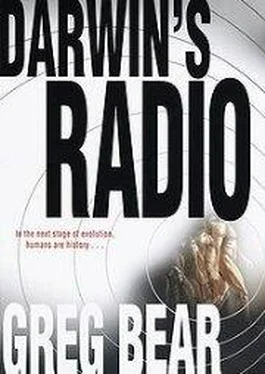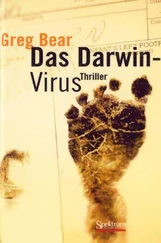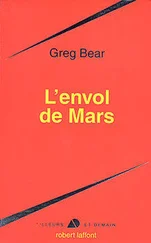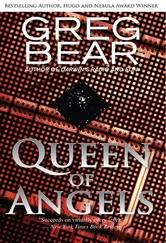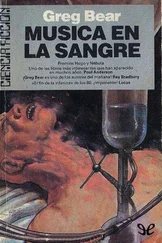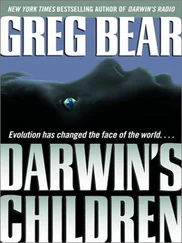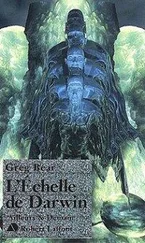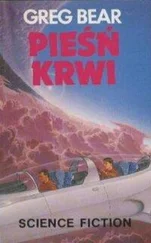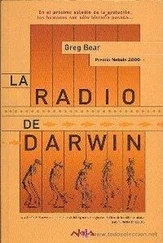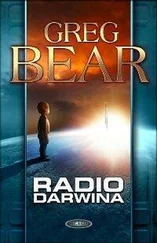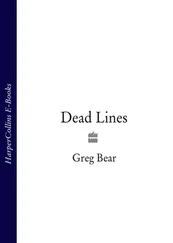Orbison was thin as a rail, hook-nosed, bald, with age spots all over his head and down his cheeks, whiskers on his moles, loose wet lips, bleary blue eyes, but he dressed in a beautiful custom-fitted pinstripe suit with wide lapels and a tie that almost filled the V of his vest.
Munsey was in his early thirties, darkly handsome, soft-spoken. He wore a smooth tobacco-colored wool suit and knew biotech almost as well as she did; in some ways, better.
“AKS may not be responsible for the failures of Mr. Mad-sen,” Orbison said in a strong, gentle voice, “but under the circumstances, we believe your company owes Ms. Lang due consideration.”
“Monetary consideration?” Munsey lifted his hands in puzzlement. “Saul Madsen could not convince his investors to keep funding him. Apparently, he had focused on a deal with a research group in the Republic of Georgia.” Munsey shook his head sadly. “My clients bought out the investors. Then- price was more than fair, considering what’s happened since.”
“Kaye put a lot of work into the company. Compensation for intellectual property—”
“She has contributed greatly to science, not to any product a potential purchaser could possibly market.”
“Then surely, fair compensation for contributing to the value of EcoBacter as a name.”
“Ms. Lang was not a legal co-owner. Saul Madsen apparently never regarded his wife as more than a managerial employee.”
“It is a regrettable lapse that Ms. Lang did not inquire,” Orbison admitted. “She trusted her husband.”
“We believe she’s entitled to whatever assets remain in the estate. EcoBacter is simply no longer one of those assets.”
Kaye looked away.
Orbison looked down at the glass-covered desktop. “Ms. Lang is a famous biological scientist, Mr. Munsey.”
“Mr. Orbison, Ms. Lang, AKS Industries buys and sells going concerns. With Saul Madsen’s death, EcoBacter is no longer a going concern. There are no valuable patents in its name, no relationships with other companies or institutions that can’t be renegotiated outside our control. The one product that could be marketable, a treatment for cholera, is actually owned by a so-called employee. Mr. Madsen was remarkably generous with his contracts. We’ll be lucky if the physical assets recoup ten percent of our costs. Ms. Lang, we can’t even make payroll for this month. Nobody’s buying.”
“We believe that given five months, using her reputation, Ms. Lang could assemble a team of solid financial backers and restart EcoBacter. Employee loyalty is very high. Many have signed letters of intent to stay with Kaye and help rebuild.”
Munsey raised his hands again: no go. “My clients follow their instincts. Perhaps Mr. Madsen should have chosen another kind of firm to sell his company to. With all respect to Ms. Lang, and nobody holds her in higher esteem than I do, she has performed no work of immediate commercial interest. Biotech is a highly competitive business, Ms. Lang, as you know.”
“The future lies in what we can create, Mr. Munsey,” Kaye said.
Munsey shook his head sadly. “You’d have my own investment in a flash, Ms. Lang. But I’m a softy. The rest of the companies…” He let his words trail off.
“Thank you, Mr. Munsey,” Orbison said, and made a tent with his hands, on which he rested his long nose.
Munsey seemed nonplussed by this dismissal. “I’m very sorry, Ms. Lang. We’re still having difficulty with our completion bond and insurance negotiations because of the way Mr. Madsen vanished.”
“He’s not coming back, if that’s what you’re worried about,” Kaye said, her voice breaking. “They found him, Mr. Munsey. He’s not going to come back and have a good laugh with us and tell me how to get on with my life.”
Munsey stared at her.
She could not stop. The words poured out. “They found him on the rocks in Long Island Sound. He was in terrible shape. I had to identify him from our wedding ring.”
“I’m deeply sorry. I hadn’t heard,” Munsey said.
“The final identification was made this morning,” Orbison told him quietly.
“I’m so very sorry, Ms. Lang.”
Munsey backed out and closed the door behind him.
Orbison watched her silently.
Kaye wiped her eyes with the backs of her hands. “I had no idea how much he meant to me, how much we had become one brain, working together. I thought I had my own mind and my own life…and now, I find out different. I feel less than half a human being. He’s dead.”
Orbison nodded.
“This afternoon I’m going back to EcoBacter and I’m going to hold a little wake with all the people there. I’m going to tell them it’s time to find work, and that I’ll be there right alongside them.”
“You’re smart and young. You’ll make it, Kaye.”
“I know I’ll make it!” she said fiercely. She hit her knee with her fist. “Goddamn him. The…bastard. The creep. He had no goddamn right!”
“No goddamn right at all,” Orbison said. “It was a cheap and dirty trick to pull on someone like you.” His eyes brightened with the kind of anger and sympathy he might have carried into a courtroom, firing up his emotions like a rusty Coleman lantern.
“Yeah,” she said, staring wildly around the room. “Oh, God, it is going to be so hard . You know what the worst part is?”
“What, dear?” Orbison asked.
“Part of me is glad ” Kaye said, and she began to weep.
“Now, now,” Orbison said, an old and weary man once more.
23
The Centers for Disease Control and Prevention, Atlanta
Neandertal mummies,” Augustine said. He strode across Dicken’s small office and shoved a folded paper onto Dicken’s desk. “Time marches on. And Newsweek, too.”
Dicken pushed aside a set of copies of infant and fetal postmortems for the last two months from Northside Hospital in Atlanta and picked up the paper. It was the Atlanta Journal-Constitution, and the headline read “Ice Couple Confirmed Prehistoric.”
He skimmed the article with little interest, just to be polite, and looked up at Augustine.
“It’s getting hot in Washington,” the director said. “They’ve asked me to assemble a taskforce.”
“You’re in charge?”
Augustine nodded.
“Good news, then,” Dicken said warily, sensing storms.
Augustine looked at him, deadpan. “We used the statistics you put together and it scared the hell out of the president. The surgeon general showed him one of the miscarriages. A picture, of course. She says she’s never seen him so upset over a national health issue. He wants us to go public right away with the full details. ‘Babies are dying,’ he says. ‘If we can fix it, go fix it, and now.’ “
Dicken waited patiently.
“Dr. Kirby thinks this could be a full-time operation. Could bring in additional appropriations, even more funds for international efforts.”
Dicken prepared to appear sympathetic.
“They don’t want to distract me by appointing me to fill her shoes.” Augustine’s eyes became beady, hard.
“Shawbeck?”
“Got the nod. But the president can make his own pick. They’ll hold a press conference on Herod’s flu tomorrow. ‘All-out war on an international killer.’ Better than polio, and politically it’s a slam dunk, unlike AIDS.”
“Kiss the babies and make them well?”
Augustine did not find that funny. “Cynicism doesn’t become you, Christopher. You’re the idealistic type, remember?”
“I blame the charged atmosphere,” Dicken said.
“Yeah. I’ve been told to put together my team for Kirby’s and Shawbeck’s approval by noon tomorrow. You’re my first choice, of course. I’ll be conferring with some folks at NIH and some scientific headhunters from New York this evening. Every agency director will want a piece of this. It’s my job in part to feed them things they can do before they try to take over the whole problem. Can you get in touch with Kaye Lang and tell her she’s going to be drafted?”
Читать дальше
Конец ознакомительного отрывка
Купить книгу
